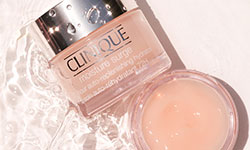Pretty Easy
Does your skin often feel dry, tight and irritated? If so, this guide is exactly what you need, as we unpack our local Derm Pro, Dr Nina’s expert advice on how to combat uncomfortable symptoms commonly associated with this skin type.
Dry skin symptoms: how do you know you have it?
Determining your skin type is crucial to creating a routine that works for you. Typically, you can do so simply by observing your skin, but what exactly are you looking for?
“You can work out your skin type by skipping your morning moisturiser and checking in on how your skin feels and looks after midday. If it feels dry and tight, you have dry skin”, explains Dr Nina.
Additionally, dry skin may sometimes appear dull, feel rough, flaky and even irritated, and start to show visible fine lines.
What causes dry skin?
If you’ve discovered you have dry skin, another question might pop in your mind… why is it dry?
Your skin type is determined by genetics, but there are internal and external factors that can impact its condition and appearance:
Skin care products - Different skincare products are developed to tackle specific concerns. If you struggle with dryness but use products for oily skin, you’re not giving your skin what it needs to be healthy.
Showers - Hot showers rob your skin of its natural oils and healthy fats, impacting its balance of moisture. To prevent this from happening, keep your showers at a reasonable temperature.
Weather - Unprotected exposure to the sun, wind and cold air causes the water in your skin to evaporate, leaving it dry and tight.
Aging process - As you age, your skin loses its natural oils, as well as its ability to renew cells, which can cause it to feel drier and rougher.
What are the best skincare ingredients for dry skin?
By now, you know what to avoid when looking for products for dry skin - anything that further dries it out is a no-no - but what exactly should you be looking for?
Hyaluronic Acid is “naturally occurring shock absorber located in the dermis” that helps alleviate skin dryness. “It hydrates the skin by locking in moisture and acts to give your skin volume. It also transports essential nutrients from the bloodstream to living skin cells”, explains Dr Nina.
Aloe vera “is a naturally derived product, mostly made up of water. It benefits the skin by creating a thin, protective film over it that shields the nerve endings”, says Dr Nina. Additionally, it has anti-inflammatory properties, which help relieve irritated dry skin.
Glycerin “moisturises the skin by drawing water from the lower cell layers”. Commonly found in cleansers and moisturisers for dry skin, it boosts hydration, heals inflamed skin and protects it against irritants, without stripping it of its natural oils.
Cica "visibly soothes and comforts dry, red, irritated skin”, says Dr Nina. Applying a cica cream for dry skin every day turns dullness and irritation into glow, thanks to its antioxidant and anti-inflammatory properties.
What is the best skincare routine for dry skin?
An effective skincare regimen doesn’t have to include dozens of steps. With super-enriched products that effectively tackle dryness and irritation, four easy steps is all you need:
Step 1: Start with a gentle cleanser for dry skin
Most cleansers are developed to eliminate oil and residue from the skin. As dry skin is often caused by the low production of natural oils, it can be tricky to find a face cleanser that hydrates, but doesn’t further dry out your skin. The secret is in choosing a fragrance-free face wash for dry skin, that is not only gentle but also formulated with the right ingredients.
Our All About Clean™ Liquid Facial Soap Extra Mild is ideal for very dry to dry skin. Perfect to use from AM to PM, this liquid face soap is formulated with ingredients like glycerin and cucumber extract, that provide long-lasting hydration, while cleansing and comforting the skin.
Step 2: Apply a moisturiser for dry skin
Developed with our richest formula yet, Moisture Surge™ Intense 72-Hour Lipid Replenishing Hydrator is a face cream for dry skin that delivers intense hydration your skin can easily absorb and hold on to for 72 hours.
This rich cream-gel is supercharged with potent ingredients that create a youthful-looking, velvety-smooth glow that lasts all day long, including activated aloe vera to deliver intense hydration, cica to soothe dry, delicate skin, and three types of lipids to reinforce and strengthen the skin’s barrier.
Step 3: Don’t forget your lips
There’s nothing more uncomfortable (and sometimes painful) than chapped lips, so we recommend a dry lip treatment that soothes and moisturises the area.
Our Moisture Surge™ Lip Hydro-Plump Treatment plumps your lips with hydration that lasts day and night.
Step 4: Hydrate throughout the day
Even if you religiously follow an effective morning skincare routine, sometimes your skin will dry out in the middle of the day, perhaps because of the cold weather or the AC in your office.
That’s why we recommend getting a portable moisture spray, like our Moisture Surge Face Spray Thirsty Skin Relief. This hydrating mist immediately replenishes your skin, thanks to the activated aloe vera, which increases hydration levels, and glycerin, which attracts and binds moisture to the skin. All of this in a portable spray that you can spritz on your face no matter where you are.
At night: Focus on repairing
While during the day it’s important to protect your skin from external factors, such as pollution and UV light, at nighttime you want to help your skin restore itself.
You can easily do so by applying an overnight mask or night cream for dry skin. Our Moisture Surge™ Overnight Mask penetrates the skin to replenish lost moisture, while also building reserves for the next day. Use it every night to wake up with a soft, dewy, glowing complexion.
How do you choose makeup for dry skin?
Once you’ve created a skincare regimen that works for you, you want to make sure that your makeup boosts the benefits you’re experiencing, rather than counteracting them.
Our best tips for choosing makeup that will help combat dryness are:
Use a primer for dry skin to add extra glow and create a smooth canvas for your makeup, like our lightweight Superprimer Face Primer.
Lay off the matte makeup, and opt for products that will create a dewy look instead.
Choose the right foundation for dry skin, developed with a liquid formula, SPF and hydrating ingredients. Our Even Better Clinical™ Serum Foundation SPF 20 ticks all the boxes.
If foundation is too much on your skin, consider replacing it with a tinted moisturiser like our Moisture Surge™ Sheertint Hydrator SPF 25, which combines makeup and skincare in one product.
Developing a skincare routine for dry skin is about selecting the right ingredients and formulas. Try out our dry skin treatments and follow Dr Nina’s advice to achieve the glowing skin you’ve always wanted.








